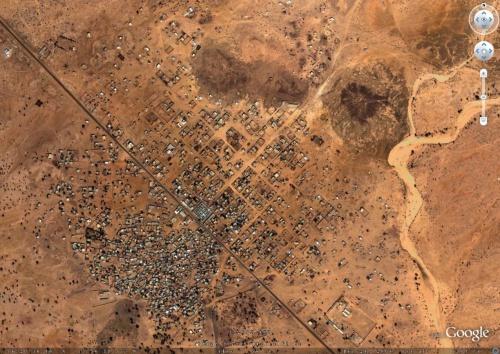OLPCorps MIT Mauritania Bababe Deployment Location
Bababé
Bababé is a small town in the Brakna Region of Mauritania. It is located between Bogue and Kaedi, two regional capitals in southern Mauritania and is two kilometers away from the Senegal River. The town is also its own department, which includes a number of smaller villages in the immediate vicinity.
According to our ground contact Zach Swank, it is a wonderful town that is right on the border between between being a "small West African village" and a "city." Although it has over eight thousand people it still has the feel of a small village. It is a tightly knit community in which everyone knows each other, the village elders still gather in the marketplace every evening, and when asked to describe their town people most often say it is like one family.
At the same time the town is rapidly developing; two massive diesel generators were installed 6 months ago and now provide power from noon to midnight. The town has a sense of forward progress. It is rapidly becoming more independent from the two regional capitals on either side, and many local, national, and international groups are working together to improve the condition of life here. With the arrival of electricity, satellite internet is becoming available as well.
There are three primary schools as well as a large middle school and high school.

Mauritania
The Islamic Republic of Mauritania is a country in northwest Africa.
Government Military Council Islam is the state religion and sharia is the law.
Culture Most Mauritanians are Sunni Muslims. Guests are expected to respect certain cultural norms (exchanges between men and women, observing a more conservative dress code, etc.) The population is composed of a combination of Moor and black. There are still ethnic tensions between black Afro-Mauritanians and White and Black Moors (Arab-Berber). The French occupied the country in 1860 in close cooperation with Maur religious leaders. Mauritania became a nation after the destruction of the kingdoms of Fouta Toro and Walo Walo and the Arab-Berber emirats of Trarza, Brakna, Taganet, and Adrar. As a result, the country has two main ethnic groups: black Africans and Arab-Berbers. The black African group includes the Fulani, Soninke, and Bambara. The Maurs include the Arab-Berbers (Beydan) and the black Maurs known as Haratin. The Haratins are black Africans who were enslaved by white Maurs. White and black Maurs consider themselves Arab, whereas black Arabs see themselves as African. The most important common denominator is Sunni Islam.
Geography The 29th largest country in the world, it has only 3000 km of paved road (about 27%). 75% of Mauritania is desert or semidesert.
Climate It is hot and dry year round Monthly Averages for Kaedi, MRT, with regular sandstorms